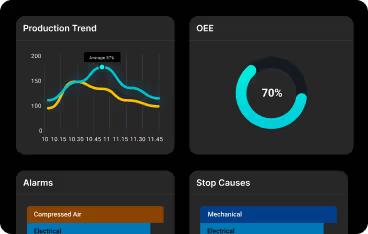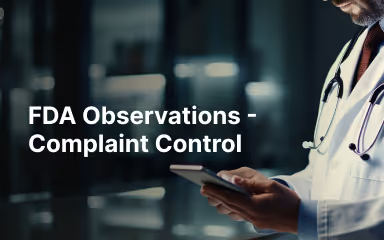QMS in Pharma Manufacturing
Introduction to QMS
QMS in Pharma, short for Quality Management System, is a structured framework designed to ensure that pharmaceutical companies adhere to rigorous quality standards, regulatory requirements, and best practices throughout the entire product lifecycle. This pharmaceutical quality management system is essential for maintaining the high standards expected in the industry, defining the quality management system's meaning and its significance.
Within the context of Pharma, QMS plays a pivotal role in mitigating quality risks, optimizing processes, and promoting a culture of continuous improvement. This ensures the pharmaceutical quality management system remains robust and effective, incorporating elements like CAPA (Corrective and Preventive Action) and change management, which are central to the pharma QMS.
Leucine's 10x QMS software introduces a new era in quality management.
With innovative features like
- Real-time deviation detection
- Intelligent CAPA workflow automation
- Automated impact assessment
it's the ultimate solution for optimizing processes. Elevate your standards, enhance efficiency, and ensure compliance seamlessly.
QMS Guidelines
The pharmaceutical industry functions under a set of rules and regulations that act as a guide through the complex terrain of ensuring quality. These guidelines, established by respected institutions like the International Organization for Standardization (ISO), the International Council for Harmonization of Technical Requirements for Pharmaceuticals for Human Use (ICH), and the World Health Organization (WHO), together serve as the foundation for a strong Quality Management System (QMS) in Pharma.

Key QMS Guidelines in Pharma
- ISO 9001:2015: ISO 9001:2015 is a globally recognized standard for QMS. It emphasizes a process-oriented approach to documenting and reviewing the structure, responsibilities, and procedures required to achieve effective quality management.
- ICH Q10: The International Council for Harmonisation (ICH) Q10 guideline provides a comprehensive model for a pharmaceutical QMS. It promotes a lifecycle approach to product quality, integrating principles of GMP, risk management, and continuous improvement, thereby addressing quality risks effectively.
- FDA 21 CFR Part 11: This standard pertains to electronic records and signatures, ensuring that electronic records and signatures are trustworthy, reliable, and equivalent to paper records. Compliance is critical for companies using computerized systems for electronic documentation, emphasizing the importance of secure and reliable electronic signatures.
Read more about QMS Guidelines
Expert Insights
Gain valuable insights from industry experts on QMS. Our subject matter experts share their knowledge and experiences to help you navigate complex QMS processes.

- In a detailed podcast, Harsh Thakkar, CEO of Qualtivate, discusses how cultivating insights from QMS data can drastically enhance decision-making and operational efficiency.
Key Components of QMS
- Deviation Management
Ensures all deviations from standard procedures are promptly documented, investigated, and resolved, identifying root causes and implementing corrective actions to prevent recurrence, ensuring compliance with regulatory standards.
- Change Control
A systematic approach to managing changes in processes, materials, or equipment, ensuring thorough evaluation, approval, and documentation to maintain product quality and regulatory compliance.
- Audit Management
Involves planning, conducting, and reviewing internal and external audits to assess compliance with regulatory requirements and internal standards, identifying areas for improvement and ensuring continuous quality enhancement.
- Market Complaints Management
A structured process for handling customer complaints, ensuring timely investigation, documentation, and resolution, with a focus on identifying root causes and implementing preventive measures to improve product quality.
- CAPA Management
Comprehensive system for identifying, investigating, and addressing root causes of quality issues through corrective and preventive actions, ensuring continuous improvement and compliance with regulatory requirements.
Quality Management Systems (QMS) are crucial in pharmaceutical manufacturing, ensuring consistent product quality and regulatory compliance. By implementing advanced solutions, following industry guidelines, seeking expert insights, and understanding FDA expectations, you can optimize your QMS processes and achieve excellence.
For more detailed information on each topic, explore the links provided. Leucine is committed to supporting your cleaning validation efforts with advanced solutions, expert insights, and comprehensive resources.
Observations in 2025

.png)
.png)

.png)



















.avif)





